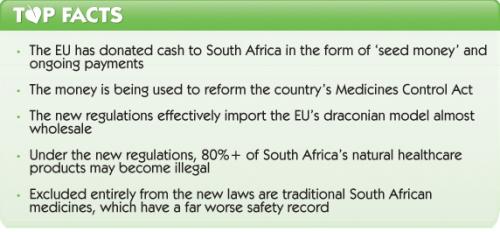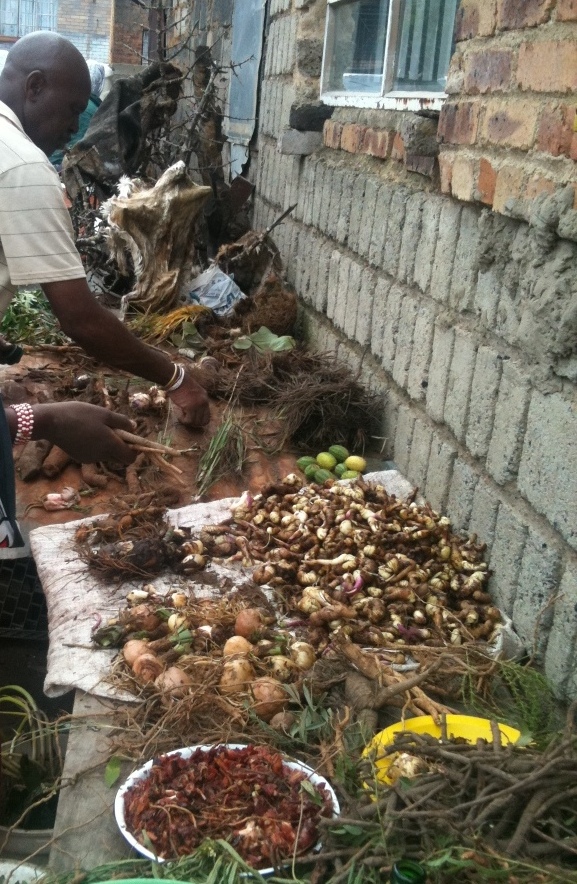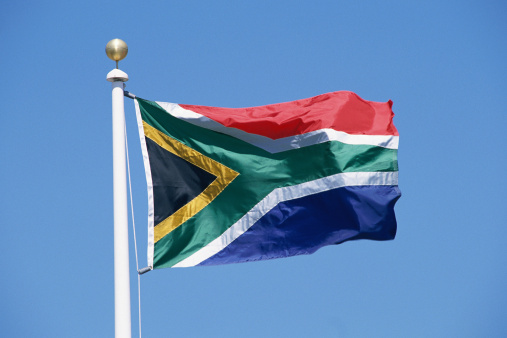The European Union (EU) has recently contributed 10 million rand (€707,500) of ‘seed money’ to develop legislation that risks wiping out 80% or more of South Africa’s existing natural products market – laws that are based almost entirely on the EU’s own repressive model. Yet, while the threatened sector has a near-unblemished safety record, indigenous traditional practices claimed to be responsible for thousands of deaths will remain entirely unregulated for apparently political reasons. And as ever, pharma will clean up at the citizens’ expense.
Seasoned health freedom campaigner Dr Anthony Rees has kept us abreast of the unfolding developments. With his help, we break this exclusive story of the threat to natural healthcare in South Africa, where the situation is as much about farce as health fascism.

Cancer lifelines threatened by new laws
Mario Ambrosini and his colleagues are gearing up for a fight. A leading international constitutional lawyer instrumental in setting up the constitutions of 27 different countries, Member of the South African Parliament and veteran of numerous high-profile civil litigation cases in his adopted homeland, Ambrosini was diagnosed with late-stage lung cancer in 2013 – which he chooses to manage entirely through natural means. Thanks to new legislation recently introduced by the South African medicines regulator, the Medicines Control Council (MCC), with no Parliamentary oversight and no meaningful consultation with the health products industry, 80% and more of the natural products currently on the market may soon disappear. These will undoubtedly include Ambrosini’s cancer lifelines. Given the confluence of Ambrosini’s positive experience of natural healthcare, his deeply held political beliefs and faith in South Africa’s constitution, he is now preparing to add his weight to a legal challenge aiming to have the new laws declared unconstitutional.
The story of South Africa’s new health products legislation is a strange one, born of equal parts health fascism and politically correct farce, if there is such a thing. It shows just how far the EU is apparently prepared to go in order to help out its friends in the pharma industry by crippling a rapidly developing natural healthcare sector.
Enforced harmonisation
In this case, ‘how far’ is the nearly 6,000 miles between Europe and South Africa. The two entities are linked by long-standing free trade agreements – in fact, the EU declares itself South Africa’s “most important development partner” – but its donation of 10 million rand (€707,500) ‘seed money’ took the relationship to a new level. The MCC and Department of Health have channelled the money into ‘building capacity’ in the South African medical products sector – in other words, as campaigner Dr Anthony Rees explains, “To legally and through enforcement harmonise our laws with those of the EU, thereby removing trade barriers that have formed through our regulations being so outdated”. This is bad news for natural healthcare in the country, even though reform of South Africa’s outdated Medicines Control Act was urgently required. Over the past 50 years, so many amendments were bolted to the Act – which was established in 1965, the same year the European Economic Community (EEC) developed its first European code for medicines in the wake of the thalidomide tragedy – that it became confusing and unwieldy. Unfortunately, the ‘solution’ turns out to be worse than the problem.

Preparing and drying out freshly dug South African traditional medicines
The new regulations will be implemented by a new body, the South African Health Products Regulatory Authority (SAHPRA), to be administered by the University of Pretoria, North West University and Rhodes University. MSc students from these universities will provide the IRM staff, 35 of whom will be trained by imported retirees from the USA Food and Drug Administration (FDA) and the UK Medicines and Healthcare products Regulatory Agency (MHRA). Training began in April 2014, and once complete, the newly qualified staff will answer to the MCC and the pharmaceutical industry. In order that the shiny new IRM can operate as a going concern into the future, it is likely that the EU will make regular donations, along with another significant donor: the Bill & Melinda Gates Foundation.
Health choice threatened worldwide
The mechanics of the new regulatory regime for natural health products closely mirror those of the Canadian situation. A new category of product – Category D – was created in South Africa on 15th November 2013. Although theoretically separate from both foods and pharmaceutical drugs, in practise Category D is a new drug category in all but name. The Canadian experience provides a worrying precedent for a large range of products that should more rightly considered as foods. Just as in South Africa, so-called ‘third category’ natural health products were required to obtain pre-market authorisation before being allowed on sale. Thanks to unsuitable pharmaceutical-style evidence requirements, 60% of license applications are currently being refused, a figure which the Canadian Natural Health Products Protection Association (NHPPA) estimates will soon rise to 80–90%.
With Category D in place, virtually all categories of natural health product in South Africa – including products associated with Western, Ayurvedic, Chinese, Unani Tibb and other non-indigenous traditional systems of medicine, vitamins and minerals, homoeopathics and aromatherapy products – will be ‘called up’ by the regulator over the next 5 years in a phased process. A call-up obliges the manufacturer to apply for pre-market authorisation in Category D, a process that carries with it the requirement for randomised, placebo-controlled clinical trials (RCTs) as proof of efficacy. Because the regulator has not published official guidance on the evidence required to support registration applications, the natural health products industry has encountered considerable frustration. Some companies have already been denied registration, despite providing RCT evidence in support of their applications; the regulator later informed them that only peer-reviewed studies are acceptable. Worryingly, it also appears that the regulator intends to arbitrarily set limits on the levels of herbs or nutrients that will be allowed in products.
Leaving aside questions as to the appropriateness of such pharmaceutical standards for natural products, the sheer expense of RCTs makes the licensing scheme too onerous for all but the largest players on the block. Inevitably, the big winners will be pharma, who can easily afford the cost. Everyone else – the small- to medium-sized companies whose innovation drives the natural products industry – will be left out in the cold.
A proven strategy
All this is wearingly familiar to observers of the EU’s drive to export its draconian attitude toward natural healthcare across the world. The South African government hasn’t strayed from the playbook, offering the usual ‘public safety’ justification for the need to clamp down on natural products. Furthermore, despite a lack of any significant evidence, “various players have been making press statements and banging on the door of the regulator, saying that these products are dangerous and need to be registered,” says Dr Anthony Rees. Clearly, the unholy alliance between government and the medical and pharmaceutical establishments operates in parallel in both the EU and South Africa.
Health fascism vs. farce
The irony of needlessly forcing an entire sector, with an exemplary safety record, to adhere to pharmaceutical safety standards descends into farce where South African traditional medicines are considered. Basically, these medicines – as prescribed by some 25,000 African traditional healers throughout the country – are completely overlooked by the new regulations. “Data we’ve collated from poison control centres, toxicology journals, hospitals, casualty admissions, etc. show that up to 20,000 deaths occur from poisoning each year from taking these traditional medicines,” explains Dr Rees. “Obviously, there will be plenty more adverse reactions. It’s a major problem, one that we’ve brought to the attention of the regulators.” Stuart Thomson, a co-founder of Dr Rees’ organisation, PHARMAPACT, worked with Canadian universities to notify the South African regulators exactly which traditional medicines are causing problems and even what antidotes exist – but their data fell on deaf ears. “Our organisation has said that, if you want to regulate any sector on a risk-only basis, traditional South African medicines should be the first in order to protect the public.”

The PHARMAPACT call to action from their website (under construction)
Think about this for a moment. No-one is proposing any system of testing, certification, pre-market authorisation or any other form of regulation for these traditional medicinal systems, whether plants, products or healers. Yet thousands of products of proven safety, used by millions of people with vanishingly low adverse event rates, are staring into the regulatory abyss. If this sounds like racial and cultural discrimination to you, PHARMAPACT would heartily agree. “We’re currently preparing for a constitutional court challenge to the new regulations, on the grounds that they are discriminatory based on ethnicity and culture,” says Dr Rees.
Juggling loyalties
In this respect, the government is attempting to keep several powerful political constituencies onside. Users and practitioners of traditional medicine are crucial to the government through sheer weight of votes and political influence. Furthermore, the pharmaceutical industry is in an intense period of bioprospecting in South Africa. A government clampdown on traditional medicines would inevitably see the custodians – traditional healers – call time on the supply of raw material for such operations.
In this context, it’s easier to see why the government has decided to throw South Africa’s natural products sector to the wolves, despite its healthy turnover of 3–4 billion rand (approximately €212,450,000–283,250,000) per annum. By comparison, the traditional medicines sector has a turnover of 2.5 billion rand (€175,000,000) (figures provided by PHARMAPACT; currency conversions via www.xe.com, 26th May 2014). PHARMAPACT expects at least 80% of these products to disappear: total devastation. “The pharma industry wants to fill this void with low potency, ineffective junk, to be honest with you,” says Dr Rees. “The most recent MCC audit from last year showed 155,000 natural products on company lists,” either on the market or waiting to be marketed. “This had shot up from around 18,000 in 2002 to 2008. We can surmise that much of the increase comes from pharma companies submitting long lists of products they want to bring to market after the regulations wipe out the existing smaller and medium companies.”
If at first you don’t succeed...
The government seems to think it can get away with this for two main reasons. One is because, although thriving, the natural products sector has comparatively little political clout. It has historically been well organised, however, which brings us to reason two. Previous government attempts to impose pharmaceutical-style regulation on the sector have been thwarted by highly effective, grassroots popular campaigns, led by groups like PHARMAPACT. So the MCC tried a different tack this time: it went back to its founding document, the outdated Medicines Control Act, and employed it to its own advantage. Even while reforming the Medicines Control Act, the MCC activated a clause giving it semi-autonomous powers to publish regulations that expand the Act. This time, the MCC got its wish, and a new regulatory system forcing the square peg of natural products into the round hole of pharmaceutical standards came into being – without a sniff of Parliamentary oversight. Dr Rees describes it as “a fait accompli. The only person to be dutifully consulted throughout the process was the Minister of Health. At no time did the MCC bring the stakeholders to the table and propose and discuss these regulations in a transparent and fair manner. In fact, most of the natural health products industry didn't even know the regulations had been passed in November 2013 until February 2014. The MCC has acted in bad faith.”
Unconstitutional law should be repealed
In the absence of any significant threat to natural healthcare in South Africa, it’s been 8 years since PHARMAPACT was an active organisation. Today, however, Dr Anthony Rees and his colleague Stuart Thomson are rallying the troops for a protracted court battle. Funds have been hastily secured to retain their legal team for the next 3 months, although the redoubtable Mr Ambrosini is working pro bono thanks to his passion for the cause. Also working on the case is administrative law expert Robin Stansham-Ford. The parallels don’t end there, since he too is controlling cancer exclusively by natural means. Ambrosini and Stansham-Ford are approaching this vital case from three angles with the aim of having the new regulations declared unconstitutional and repealed in their entirety. They provide striking parallels to the grounds for ANH-Intl’s own proposed legal challenge:
- Expose flaws in the administrative process leading up to the publication of the new regulations
- Press the inequality and discrimination issues described earlier
- Highlight the impossibility for the natural products industry of complying with the onerous pre-market authorisation standards.
A crucial case with worldwide implications
The South African case is clearly crucial to a large number of South Africa’s population, but it may potentially have wider implications. Unlike in the US, where the FDA is constantly finding new ways to undermine and subvert the Dietary Supplements Health and Education Act (DSHEA) in the direction of EU legislation, South Africa has imported the EU model more or less lock, stock and barrel. Success in South Africa could well give other countries ideas – but Dr Rees is convinced his government has overstepped the mark. “It’s an open and shut case,” he affirms. “The constitution says that the State may not discriminate on culture, ethnicity, social origin or tradition, and if there is any discrimination it is up to the State to prove that the discrimination is fair. We contend that the MCC cannot prove that this discrimination is fair.”
We and millions of other natural healthcare advocates worldwide can only hope he is correct. We will keep you abreast of further developments.
PHARMAPACT is grateful for any financial support for its constitutional challenge – we will happily connect any potential donors with the PHARMAPACT team, especially while its new website remains under construction.








Comments
your voice counts
There are currently no comments on this post.
Your voice counts
We welcome your comments and are very interested in your point of view, but we ask that you keep them relevant to the article, that they be civil and without commercial links. All comments are moderated prior to being published. We reserve the right to edit or not publish comments that we consider abusive or offensive.
There is extra content here from a third party provider. You will be unable to see this content unless you agree to allow Content Cookies. Cookie Preferences